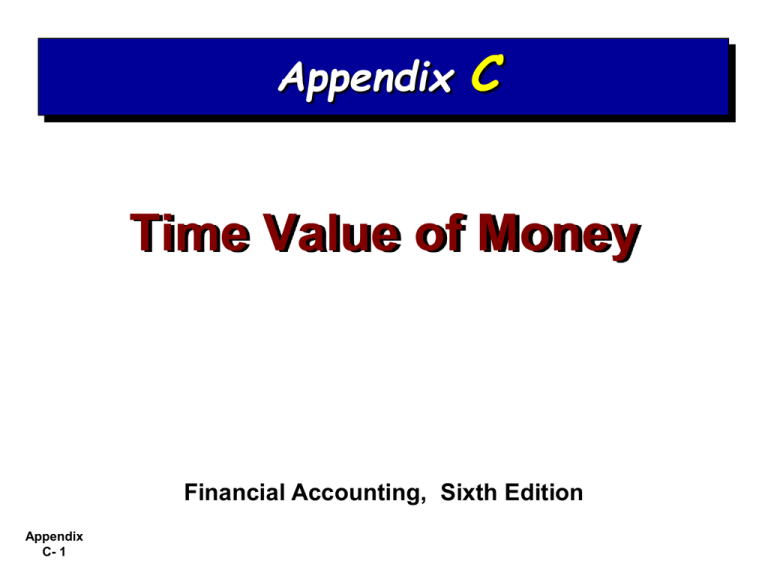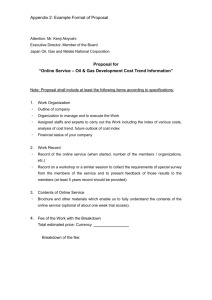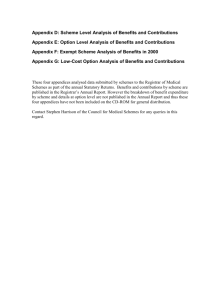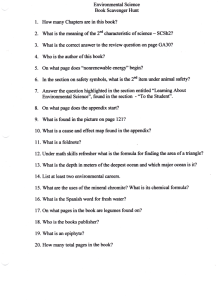
Appendix
C
Time Value of Money
Financial Accounting, Sixth Edition
Appendix
C- 1
Study Objectives
1.
Distinguish between simple and compound interest.
2.
Solve for future value of a single amount.
3.
Solve for future value of an annuity.
4.
Identify the variables fundamental to solving present
value problems.
5.
Solve for present value of a single amount.
6.
Solve for present value of an annuity.
7.
Compute the present value of notes and bonds.
8.
Use a financial calculator to solve time value of money
problems.
Appendix
C- 2
Basic Time Value Concepts
Time Value of Money
In accounting (and finance), the term indicates
that a dollar received today is worth more than a
dollar promised at some time in the future.
Appendix
C- 3
Basic Time Value Concepts
Nature of Interest
Payment for the use of money.
Excess cash received or repaid over the amount
borrowed (principal).
Variables involved in financing transaction:
1. Principal (p) - Amount borrowed or invested.
2. Interest Rate
3. Time
(i) – An annual percentage.
(n) - The number of years or portion of a
year that the principal is outstanding.
Appendix
C- 4
Simple Interest
Interest computed on the principal only.
ILLUSTRATION:
On January 2, 2007, Tomalczyk borrows $20,000 for 3
years at a rate of 7% per year. Calculate the annual
interest cost.
Principal
FULL YEAR
Appendix
C- 5
Interest rate
Annual interest
$20,000
x
7%
$ 1,400
SO 1 Distinguish between simple and compound interest.
Simple Interest
ILLUSTRATION continued:
On March 31, 2007, Tomalczyk borrows $20,000 for 3
years at a rate of 7% per year. Calculate the interest
cost for the year ending December 31, 2007.
PARTIAL
YEAR
Principal
Interest rate
Annual interest
$20,000
x
7%
$ 1,400
Partial year
x
Interest for 9 months
Appendix
C- 6
9/12
$ 1,050
SO 1 Distinguish between simple and compound interest.
Compound Interest
Computes interest on
the principal and
any interest earned that has not been paid or
withdrawn.
Most business situations use compound interest.
Appendix
C- 7
SO 1 Distinguish between simple and compound interest.
Compound Interest
ILLUSTRATION:
On January 2, 2007, Tomalczyk borrows $20,000 for 3
years at a rate of 7% per year. Calculate the total
interest cost for all three years, assuming interest is
compounded annually.
Date
Jan. 2007
2007
2008
2009
Compound Interest
Calculation
$20,000 x 7%
$21,400 x 7%
$22,898 x 7%
Interest
$
$
Appendix
C- 8
1,400
1,498
1,603
4,501
Accumulated
Balance
$
20,000
21,400
22,898
24,501
SO 1 Distinguish between simple and compound interest.
Future Value Concepts
Future Value of a Single Amount
The value at a future date of a given amount
invested assuming compound interest.
FV = p x (1 + i )n
Illustration C-3
Formula for future value
FV = future value of a single amount
p = principal (or present value)
i = interest rate for one period
n = number of periods
Appendix
C- 9
SO 2 Solve future value of a single amount.
Future Value Concepts
Future Value of a Single Amount
The value at a future date of a given amount
invested assuming compound interest.
Illustration:
Exercise: Steve Allen invested $10,000 today in a
fund that earns 8% compounded annually. To what
amount will the investment grow in 3 years?
Appendix
C- 10
SO 2 Solve future value of a single amount.
Future Value Concepts
Present Value
$10,000
0
1
Future Value?
2
3
4
5
6
Exercise: Steve Allen invested $10,000 today in a
fund that earns 8% compounded annually. To what
amount will the investment grow in 3 years?
What table do we use?
Appendix
C- 11
SO 2 Solve future value of a single amount.
Future Value Concepts
Table 1
Number
of
Periods
2%
1
2
3
4
5
1.02000
1.04040
1.06121
1.08243
1.10408
Discount Rate
8%
6%
4%
1.04000
1.08160
1.12486
1.16986
1.21665
1.06000
1.12360
1.19102
1.26248
1.33823
1.08000
1.16640
1.25971
1.36049
1.46933
10%
1.10000
1.21000
1.33100
1.46410
1.61051
What factor do we use?
Appendix
C- 12
SO 2 Solve future value of a single amount.
Future Value Concepts
Table 1
Number
of
Periods
2%
1
2
3
4
5
1.02000
1.04040
1.06121
1.08243
1.10408
$10,000
Present Value
Appendix
C- 13
Discount Rate
8%
6%
4%
x
1.04000
1.08160
1.12486
1.16986
1.21665
1.06000
1.12360
1.19102
1.26248
1.33823
1.25971
Factor
=
1.08000
1.16640
1.25971
1.36049
1.46933
10%
1.10000
1.21000
1.33100
1.46410
1.61051
$12,597
Future Value
SO 2 Solve future value of a single amount.
Future Value Concepts
PROOF - Future Value of a Single Sum
Year
1
2
3
Beginning
Balance
Rate
$ 10,000 x 8%
10,800 x 8%
11,664 x 8%
Previous
Year-End
Interest
Balance
Balance
=
800 + 10,000 = $ 10,800
=
864 + 10,800 =
11,664
=
933 + 11,664 =
12,597
Exercise: Steve Allen invested $10,000 today in a
fund that earns 8% compounded annually. To what
amount will the investment grow in 3 years?
Appendix
C- 14
SO 2 Solve future value of a single amount.
Future Value Concepts
Present Value
$10,000
0
1
Future Value?
2
3
4
5
6
Exercise: Steve Allen invested $10,000 today in a
fund that earns 8% compounded semiannually. To what
amount will the investment grow in 3 years?
What table do we use?
Appendix
C- 15
SO 2 Solve future value of a single amount.
Future Value Concepts
Table 1
Number
of
Periods
2%
1
2
3
4
5
6
1.02000
1.04040
1.06121
1.08243
1.10408
1.12616
Discount Rate
8%
6%
4%
1.04000
1.08160
1.12486
1.16986
1.21665
1.26532
What factor do we use?
Appendix
C- 16
1.06000
1.12360
1.19102
1.26248
1.33823
1.41852
1.08000
1.16640
1.25971
1.36049
1.46933
1.58687
10%
1.10000
1.21000
1.33100
1.46410
1.61051
1.77156
• 6 compounding periods
• 4% interest per period
SO 2 Solve future value of a single amount.
Future Value Concepts
Table 1
Number
of
Periods
2%
1
2
3
4
5
6
1.02000
1.04040
1.06121
1.08243
1.10408
1.12616
$10,000
Present Value
Appendix
C- 17
Discount Rate
8%
6%
4%
x
1.04000
1.08160
1.12486
1.16986
1.21665
1.26532
1.06000
1.12360
1.19102
1.26248
1.33823
1.41852
1.26532
Factor
=
1.08000
1.16640
1.25971
1.36049
1.46933
1.58687
10%
1.10000
1.21000
1.33100
1.46410
1.61051
1.77156
$12,653
Future Value
SO 2 Solve future value of a single amount.
Future Value Concepts
Annuity requires the following:
(1) Periodic payments or receipts of the
same amount,
(2) Same-length interval between
payments or receipts,
(3) Compounding of interest each interval.
The future value of an annuity is the sum of all the
payments (receipts) plus the accumulated compound
interest on them.
Appendix
C- 18
SO 3 Solve for future value of an annuity.
Future Value Concepts
Future Value of an Annuity
Rents occur at the end of each period.
No interest during 1st period.
Future Value
Present Value
$20,000 20,000
0
Appendix
C- 19
1
2
20,000
20,000
20,000
20,000
20,000
20,000
3
4
5
6
7
8
SO 3 Solve for future value of an annuity.
Future Value Concepts
Future Value
Present Value
$20,000 20,000
0
1
2
20,000
20,000
20,000
20,000
20,000
20,000
3
4
5
6
7
8
Exercise: Bayou Inc. will deposit $20,000 in a 12%
fund at the end of each year for 8 years beginning
December 31, Year 1. What amount will be in the fund
immediately after the last deposit?
What table do we use?
Appendix
C- 20
SO 3 Solve for future value of an annuity.
Future Value Concepts
Table 2
Number
of
Periods
4%
6%
2
4
6
8
10
2.04000
4.24646
6.63298
9.21423
12.00611
2.06000
4.37462
6.97532
9.89747
13.18079
Discount Rate
8%
10%
12%
2.08000
4.50611
7.33592
10.63663
14.48656
2.10000
4.64100
7.71561
11.43589
15.93743
2.12000
4.77933
8.11519
12.29969
17.54874
What factor do we use?
Appendix
C- 21
SO 3 Solve for future value of an annuity.
Future Value Concepts
Table 2
Number
of
Periods
4%
6%
2
4
6
8
10
2.04000
4.24646
6.63298
9.21423
12.00611
2.06000
4.37462
6.97532
9.89747
13.18079
$20,000
Deposit
Appendix
C- 22
x
Discount Rate
8%
10%
12%
2.08000
4.50611
7.33592
10.63663
14.48656
2.10000
4.64100
7.71561
11.43589
15.93743
2.12000
4.77933
8.11519
12.29969
17.54874
12.29969
Factor
=
$245,994
Future Value
SO 3 Solve for future value of an annuity.
Present Value Concepts
The present value is the value now of a given amount
to be paid or received in the future, assuming
compound interest.
Present value variables:
1. Dollar amount to be received in the future,
2. Length of time until amount is received, and
3. Interest rate (the discount rate).
Appendix
C- 23
SO 4 Identify the variables fundamental to solving present value problems.
Present Value Concepts
Present Value of a Single Amount
PV = FV / (1 + i )n
Illustration C-9
Formula for present value
PV = present value of a single amount
FV = future value of a single amount
p = principal (or present value)
i = interest rate for one period
n = number of periods
Appendix
C- 24
SO 5 Solve for present value of a single amount.
Present Value Concepts
Present Value of a Single Amount
Multiply the present value factor by the future
value.
Illustration:
Exercise: Itzak Perlman needs $20,000 in 4 years.
What amount must he invest today if his investment
earns 12% compounded annually?
Appendix
C- 25
SO 5 Solve for present value of a single amount.
Present Value Concepts
Future Value
$20,000
Present Value?
0
1
2
3
4
5
6
Exercise: Itzak Perlman needs $20,000 in 4 years.
What amount must he invest today if his investment
earns 12% compounded annually?
What table do we use?
Appendix
C- 26
SO 5 Solve for present value of a single amount.
Present Value Concepts
Table 3
Number
of
Periods
4%
2
.92456
.89000
.85734
.82645
.79719
4
.85480
.79209
.73503
.68301
.63552
6
.79031
.70496
.63017
.56447
.50663
8
.73069
.62741
.54027
.46651
.40388
Discount Rate
6%
8%
10%
12%
What factor do we use?
Appendix
C- 27
SO 5 Solve for present value of a single amount.
Present Value Concepts
Table 3
Number
of
Periods
4%
2
.92456
.89000
.85734
.82645
.79719
4
.85480
.79209
.73503
.68301
.63552
6
.79031
.70496
.63017
.56447
.50663
8
.73069
.62741
.54027
.46651
.40388
$20,000
Future Value
Appendix
C- 28
Discount Rate
6%
8%
10%
x
.63552
Factor
=
12%
$12,710
Present Value
SO 5 Solve for present value of a single amount.
Present Value Concepts
Future Value
$20,000
Present Value?
0
1
2
3
4
5
6
Exercise: Itzak Perlman needs $20,000 in 4 years.
What amount must he invest today if his investment
earns 12% compounded quarterly?
What table do we use?
Appendix
C- 29
SO 5 Solve for present value of a single amount.
Present Value Concepts
Table 3
Number
of
Periods
3%
4
0.88849
0.85480
0.79209
0.70843
0.63552
8
0.78941
0.73069
0.62741
0.50187
0.40388
12
0.70138
0.62460
0.49697
0.35554
0.25668
16
0.62317
0.53391
0.39365
0.25187
0.16312
Discount Rate
4%
6%
9%
12%
What factor do we use?
Appendix
C- 30
SO 5 Solve for present value of a single amount.
Present Value Concepts
Table 3
Number
of
Periods
3%
4
0.88849
0.85480
0.79209
0.70843
0.63552
8
0.78941
0.73069
0.62741
0.50187
0.40388
12
0.70138
0.62460
0.49697
0.35554
0.25668
16
0.62317
0.53391
0.39365
0.25187
0.16312
$20,000
Future Value
Appendix
C- 31
Discount Rate
4%
6%
9%
x
.62317
Factor
=
12%
$12,463
Present Value
SO 5 Solve for present value of a single amount.
Present Value Concepts
Present Value of an Annuity
The value now of a series of future receipts or
payments, discounted assuming compound
interest.
Present Value
$100,000
100,000
100,000
100,000
100,000
100,000
.....
0
Appendix
C- 32
1
2
3
4
19
20
SO 6 Solve for present value of an annuity.
Present Value Concepts
Present Value
$100,000
100,000
100,000
100,000
100,000
100,000
.....
0
1
2
3
4
19
20
Jaime Yuen wins $2,000,000 in the state lottery. She
will be paid $100,000 at the end of each year for the
next 20 years. What is the present value of her
winnings? Assume an appropriate interest rate of 8%.
What table do we use?
Appendix
C- 33
SO 6 Solve for present value of an annuity.
Present Value Concepts
Table 4
Number
of
Periods
4%
6%
1
5
10
15
20
0.96154
4.45183
8.11090
11.11839
13.59033
0.94340
4.21236
7.36009
9.71225
11.46992
Discount Rate
8%
0.92593
3.99271
6.71008
8.55948
9.81815
10%
0.90900
3.79079
6.14457
7.60608
8.51356
12%
0.89286
3.60478
5.65022
6.81086
7.46944
What factor do we use?
Appendix
C- 34
SO 6 Solve for present value of an annuity.
Present Value Concepts
Table 4
Number
of
Periods
4%
6%
1
5
10
15
20
0.96154
4.45183
8.11090
11.11839
13.59033
0.94340
4.21236
7.36009
9.71225
11.46992
$100,000
Receipt
Appendix
C- 35
x
Discount Rate
8%
0.92593
3.99271
6.71008
8.55948
9.81815
9.81815
Factor
=
10%
0.90900
3.79079
6.14457
7.60608
8.51356
12%
0.89286
3.60478
5.65022
6.81086
7.46944
$981,815
Present Value
SO 6 Solve for present value of an annuity.
Present Value Concepts
Present Value of a Long-term Note or Bond
Two Cash Flows:
Periodic interest payments (annuity).
Principal paid at maturity (single-sum).
1,000,000
$70,000
70,000
70,000
70,000
70,000
70,000
9
10
.....
0
Appendix
C- 36
1
2
3
4
SO 7 Compute the present value of notes and bonds.
Present Value Concepts
Present Value
$70,000
70,000
70,000
70,000
70,000
1,070,000
.....
0
1
2
3
4
9
10
Exercise: Arcadian Inc. issues $1,000,000 of 7% bonds
due in 10 years with interest payable at year-end. The
current market rate of interest for bonds is 8%. What
amount will Arcadian receive when it issues the bonds?
Appendix
C- 37
SO 7 Compute the present value of notes and bonds.
Present Value Concepts
PV of Interest
Table 4
Number
of
Periods
4%
6%
1
5
10
15
20
0.96154
4.45183
8.11090
11.11839
13.59033
0.94340
4.21236
7.36009
9.71225
11.46992
$70,000
x
Interest Payment
Appendix
C- 38
Discount Rate
8%
0.92593
3.99271
6.71008
8.55948
9.81815
6.71008
Factor
=
12%
10%
0.90900
3.79079
6.14457
7.60608
8.51356
0.89286
3.60478
5.65022
6.81086
7.46944
$469,706
Present Value
SO 7 Compute the present value of notes and bonds.
Present Value Concepts
PV of Principal
Table 3
Number
of
Periods
1
5
10
15
20
4%
0.96154
0.82193
0.67556
0.55526
0.45639
$1,000,000
Principal Payment
Appendix
C- 39
6%
Discount Rate
8%
0.94340
0.74726
0.55839
0.41727
0.31180
x
0.92593
0.68058
0.46319
0.31524
0.21455
.46319
Factor
=
10%
0.90909
0.62092
0.38554
0.23939
0.14864
12%
0.89286
0.56743
0.32197
0.18270
0.10367
$463,190
Present Value
SO 7 Compute the present value of notes and bonds.
Present Value Concepts
Exercise: Arcadian Inc. issues $1,000,000 of 7% bonds
due in 10 years with interest payable at year-end.
Present value of Interest
$469,706
Present value of Principal
463,190
Bond current market value
Date Account Title
Debit
Cash
Credit
932,896
Discount on Bonds
Bonds Payable
Appendix
C- 40
$932,896
67,104
1,000,000
SO 7 Compute the present value of notes and bonds.
Using Financial Calculators
PV = present value of a single amount
Illustration C-22
Financial calculator keys
N = number of periods
I = interest rate per period
PV = present value
PMT = payment
FV = future value
Appendix
C- 41
SO 8 Use a financial calculator to solve time value of money problems.
Using Financial Calculators
Present Value of a Single Sum
Assume that you want to know the present value of
$84,253 to be received in five years, discounted
at 11% compounded annually.
Illustration C-23
Calculator solution for
present value of a single sum
Appendix
C- 42
SO 8 Use a financial calculator to solve time value of money problems.
Using Financial Calculators
Present Value of an Annuity
Assume that you are asked to determine the present
value of rental receipts of $6,000 each to be
received at the end of each of the next five years,
Illustration C-24
when discounted at 12%.
Calculator solution for
present value of an annuity
Appendix
C- 43
SO 8 Use a financial calculator to solve time value of money problems.
Using Financial Calculators
Useful Applications – Auto Loan
The loan has a 9.5% nominal annual interest rate,
compounded monthly. The price of the car is $6,000,
and you want to determine the monthly payments,
assuming that the payments start one month after
the purchase.
Illustration C-25
Appendix
C- 44
SO 8 Use a financial calculator to solve time value of money problems.
Using Financial Calculators
Useful Applications – Mortgage Loan
You decide that the maximum mortgage payment you
can afford is $700 per month. The annual interest
rate is 8.4%. If you get a mortgage that requires you
to make monthly payments over a 15-year period,
what is the maximum purchase price you can afford?
Illustration C-26
Appendix
C- 45
SO 8 Use a financial calculator to solve time value of money problems.
Copyright
“Copyright © 2008 John Wiley & Sons, Inc. All rights reserved.
Reproduction or translation of this work beyond that permitted
in Section 117 of the 1976 United States Copyright Act without
the express written permission of the copyright owner is
unlawful. Request for further information should be addressed
to the Permissions Department, John Wiley & Sons, Inc. The
purchaser may make back-up copies for his/her own use only
and not for distribution or resale. The Publisher assumes no
responsibility for errors, omissions, or damages, caused by the
use of these programs or from the use of the information
contained herein.”
Appendix
C- 46




